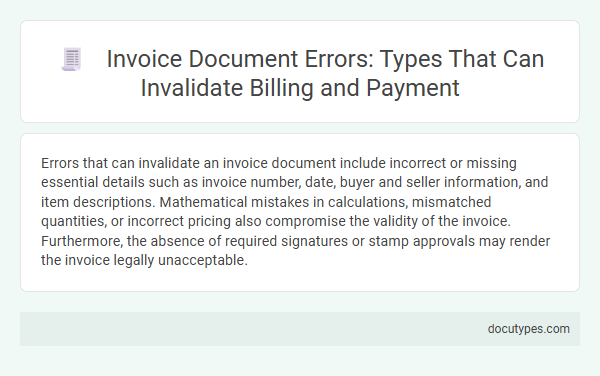Errors that can invalidate an invoice document include incorrect or missing essential details such as invoice number, date, buyer and seller information, and item descriptions. Mathematical mistakes in calculations, mismatched quantities, or incorrect pricing also compromise the validity of the invoice. Furthermore, the absence of required signatures or stamp approvals may render the invoice legally unacceptable.
Common Types of Invoice Document Errors
Common types of invoice document errors include incorrect billing information, such as wrong customer details or addresses, which can delay payment processing. Calculation mistakes, like inaccurate totals or tax amounts, often lead to disputes and require correction before approval. Missing essential elements, such as invoice numbers or dates, invalidate the document and complicate record-keeping and auditing processes.
Missing Mandatory Information on Invoices
| Types of Errors That Can Invalidate an Invoice Document | |
|---|---|
| Missing Mandatory Information |
Invoices must contain essential details to be legally valid. Absence of such mandatory information can lead to rejection or non-payment. Key missing elements include:
|
Incorrect Customer or Supplier Details
Incorrect customer or supplier details can invalidate an invoice, causing payment delays and disputes. Errors such as misspelled names, wrong addresses, or incorrect tax identification numbers compromise the document's legitimacy.
Ensuring the accuracy of your customer or supplier information is crucial for smooth transaction processing. Verifying these details before issuing the invoice helps prevent rejections and maintains trust between parties.
Calculation Mistakes and Misapplied Taxes
Calculation mistakes in invoices, such as incorrect arithmetic on item totals or overall sums, can lead to disputes and payment delays. These errors undermine the document's accuracy, potentially invalidating the invoice under accounting standards.
Misapplied taxes occur when incorrect tax rates or exemptions are used, resulting in undercharging or overcharging clients. Such tax discrepancies violate regulatory compliance and may cause the invoice to be rejected by tax authorities.
Duplicate Billing and Invoices
Invoice documents must be accurate to ensure smooth financial transactions and legal compliance. Errors like duplicate billing and repeated invoices can cause significant issues, including payment delays and disputes.
- Duplicate Billing - Occurs when the same goods or services are charged multiple times on separate invoices to the same customer.
- Repeated Invoices - Happens when identical invoices with the same invoice number and amount are issued more than once for the same transaction.
- Invalidation Risk - Both errors can lead to invoice rejection by accounting systems, triggering payment delays and potential audit flags.
Mismatched Purchase Orders and Invoices
Mismatched purchase orders and invoices often lead to invoice invalidation due to discrepancies in quantities, prices, or item descriptions. Accurate alignment between the purchase order details and invoice data is crucial for verification and payment processing. Errors in these areas disrupt audit trails and can cause delays or disputes in financial transactions.
Invalid or Expired Invoice Numbers
What types of errors can invalidate an invoice document? Invalid or expired invoice numbers are common issues that cause rejection. Your invoice must have a valid, unique invoice number to ensure proper processing.
Improper Invoice Formatting and Structure
Improper invoice formatting and structure can lead to the invalidation of an invoice document. Ensuring your invoice meets required standards is crucial for timely payments and legal compliance.
- Missing Mandatory Fields - Failure to include essential details like invoice number, date, or tax identification can render the invoice invalid.
- Disorganized Layout - A cluttered or confusing format makes it difficult to verify charges and may cause processing delays or rejections.
- Lack of Clear Itemization - Absence of detailed descriptions and quantities can result in disputes and non-acceptance by accounting systems.
Correct and consistent invoice formatting protects your business by ensuring smooth transaction processing and legal validity.
Unauthorized or Unapproved Charges
Unauthorized or unapproved charges on an invoice can lead to its invalidation, as they indicate discrepancies between the billed amount and the agreed terms. These charges often arise from errors such as incorrect pricing, unauthorized service fees, or unexpected product costs.
Invoices containing unauthorized charges fail to meet compliance standards and can be rejected by accounting departments or clients. Detecting these errors requires thorough verification against contracts, purchase orders, and prior approvals. Correcting such discrepancies promptly helps maintain accurate financial records and ensures payment processing without delays.
What Types of Errors Can Invalidate an Invoice Document? Infographic

